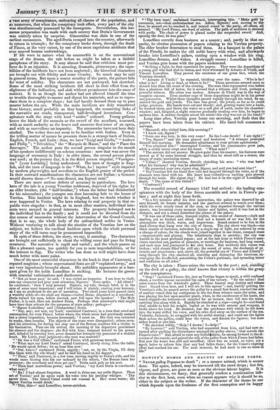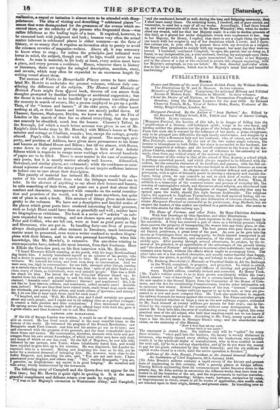'WHITT'S HOMES AND HAUNTS OF BRITISH POETS.
" Nityza gallop Pegasus to death " ; or a meaner animal, which is sooner done. The space, indeed, may be traversed till the steed drops; but fire, vigour, and grace, are gone as soon as the obvious labour begins. It is this circumstance, we fancy, that generally renders a continuation infe- rior to the first heat, even when no reason appears why it should be so, either in the subject or the writer. If the character of the theme be one which depends upon the freshness of the first conception and its happy realization, a sequel or imitation is almost sure to be attended with disap- pointment. The idea of visiting and describing " celebrated places"— scenes that were distinguished for the greatness of the events which oc-
curred there, or the celebrity of the persons who frequented them—was rather felicitous as the leading topic of a tour. It required, however, to be executed both with judgment and luck ; because very often the actual matter inherent in celebrated places is either common—as the facts of history, or so scanty that it requires an invention akin to poetry to avoid the common reveries of magazine-writers. Above all, it was necessary to know when to stop ; for unless the principles just indicated were borne in mind, the subject, though run off its legs, would never be run down. As man is material, in his body at least, every action must have a place, and every person a residence. Hence, wherever there is history or literature, there are topics for mingled description, anecdote, story, and reverie, which may often be expanded to an enormous length by writing round about them.
The success of Visits to Remarkable Places seems to have stimu- lated Mr. Howitt to undertake the present volumes, without duly con- sidering the difference of the subjects. The Homes and Haunts of British Poets might form al good book, thrown off con amore from thoughts prompted by familiar knowledge or accidental suggestion ; but the theme is too ethereal to be handled by a gentleman travelling about the country in search of scenes, like a person employed to get up a guide. Then, of the "homes and haunts" of the elder poets, we either know nothing at all, or their haunts and homes are mostly pulled down. Of Chaucer, Spenser, Shakspere, Dryden, we know so little, or the Fire of London or the march of time has so altered everything, that the spots can scarcely be identified, much less the houses. Chaucer's Talbot, in the Borough, (of which a much better account was given in one of Mr. Knight's little books than by Mr. Howitt,) with Wilton's house at West- minster and cottage at Chalfont, remain ; but, except the cottage, greatly altered. Pope's villa is levelled with the ground. The marriage, pro- perty, and position of Addison, have given more permanence to his home and haunts at Holland House and Bilion ; but till we almost, with Burns, come down to the present generation, there is little of that definite fulness which is requisite to escape mere verbiage when several hundreds of pages are to be filled. There is more matter in the case of contempo- rary poets, but it is mostly matter already well known. Abbotsford, Newstead, and similar places, are exhausted ; while the residences or occa- sional sojourns of some of the minor poets do not inspire sufficient interest to induce one to care about their description. This paucity of material has induced Mr. Howitt to render the cha- racter of his work different from what the titlepage would lead one to infer. In the absence of anything to say about their homes and haunts, he tells something of their lives, and pours out a good deal about their conduct and character, interspersed with remarks on the social constitu- tion and practices of the world, not in good taste anywhere, but quite out of place in such a book. This mixture of things gives much incon- gruity to the volumes. We have not a descriptive and fanciful notice of the places which great poets have rendered interesting by their presence, such as Leigh Hunt could have done so gracefully and well ; neither have we biographies or criticisms. The book is a series of "articles " on sub- jects expanded by mere writing, and not chosen upon any principle; for Prior and Collins, who are left out, were at least as good poets as Gay and Shenstone, who are put in. In handling forty-one lives of persons always distinguished and often eminent in literature, much interesting matter must be presented, even were a writer confined to modern biogra- phies with their fulness, and to his own personal knowledge, when this knowledge, like Mr. Howitt's, is extensive. The anecdotes relating to contemporaries have, indeed, the most interest, from their freshness. Here is Elliott the Corn-law poet, on his first interview with Mr. Howitt. "I found Ebenezer Elliott standing at hisporch, with his huge Newfoundland dog beside him. I merely introduced myself as an admirer of his poetry, who had a desire in passing to pay my respects to him. He gave me a very cordial welcome. We entered his room, and were soon deep in conversation. And we were soon, too, high iu conversation: for our talk, amongst other things, turning on a certain class of society, I happened to say, that ' spite of all their faults as a class, many of them, as individuals, were very amiable people.' This was a little too much for him. The latent fire of the Corn-law Rhymer blazed up; he started from his chair, and, pacing to and fro with his hands at his back, ex- claimed, Amiable men! amiable robbers! thieves I and murderers! Sir, I do not like to hear thieves, robbers, and murderers, called amiable men 1 Amiable men, indeed I Who are they that have ruined trade, made bread dear, made mur- der wholesale, put poverty into prison, and made crimes of ignorance and misery ? Sir, I do not like to hear such terms used for such men I ' "I laughed, and said, Well, Mr. Elliott, you and I shall certainly not quarrel about any such people; and I ought not to sit talking thus as a perfect stranger: it creates a false position and false conclusions.' I then mentioned my name. He sprang across the room, caught hold of my offered hand with both his, gave it a great shake, and then hastened out to call Mrs. Elliott."
LANDOR AND BONAPARTE.
If the life of Savage Lander was written, it would be one of the most remark- able on record. He has lived much abroad in the most eventful times in the history of the world. He witnessed the progress of the French Revolution; saw Bonaparte made First Consul; saw him and his armies go out to victory; saw and conversed with the greatest of his generals, and the most remarkable men of those times and scenes. His conversation, therefore, abounds with facts and per- sonages from his own actual knowledge, of which most other men have only read, and many of which no one has read. On the fall of Napoleon, he saw him ride, followed by one servant, into Tours; whose inhabitants bated him, and would have rejoiced to give him up to his enemies. He was disguised; but Lander re- cognized him in a moment. Hating and despising the man as he did, yet he never for a moment dreamed of betraying him. He, however, went close to the fallen Emperor, and, touching his arm, said, "Yon are not safe here: I have penetrated your disguise, and others may." "Sir," replied Bonaparte, " you are, I perceive, an Englishman: my secret is in good keeping." He mounted and rode away, wholly undiscovered by the townsmen.
The following story of Campbell and the Queen does not appear for the first time; but Mr. Howitt is quite right in quoting it- It is the most graceful compliment and delicate return ever made by royalty. "' I was at her Mejesty's coronation in Westminster Abbey, said Campbell; ' and she conducted herself so well, during the long and fatiguing ceremony, that I shed tears many times. On returning home, I resolved, out of pure esteem and veneration, to send her a copy of all my works. Accordingly, I had them bound up, and went personally with them to Sir Henry Wheatley; who, when he under, stood my errand, told me that her Majesty made it a rule to decline presents of this kind, as it placed her under obligations which were unpleasant to her. Say to her Majesty, Sir Henry, I replied, that there is not a single thing the Queen can touch with her sceptre in any of her dominions which I covet; and I there- fore entreat you, in your office, to present them with my devotion as a subject. Sir Henry then promised to comply with my request; but next day they were re- turned. I hesitated,' continued Campbell, to open the parcel; but on doing so, I found, to my inexpressible joy, a note enclosed, desiring my autograph upon them. Having complied with the wish, I again transmitted the books to her Majesty; and in the course of a day or two received in return this elegant engraving, with her Majesty's autograph, as you see below.' He then directed particular atten- tion to the royal signature, which was in her Majesty's usual bold and beautiful handwriting.































 Previous page
Previous page